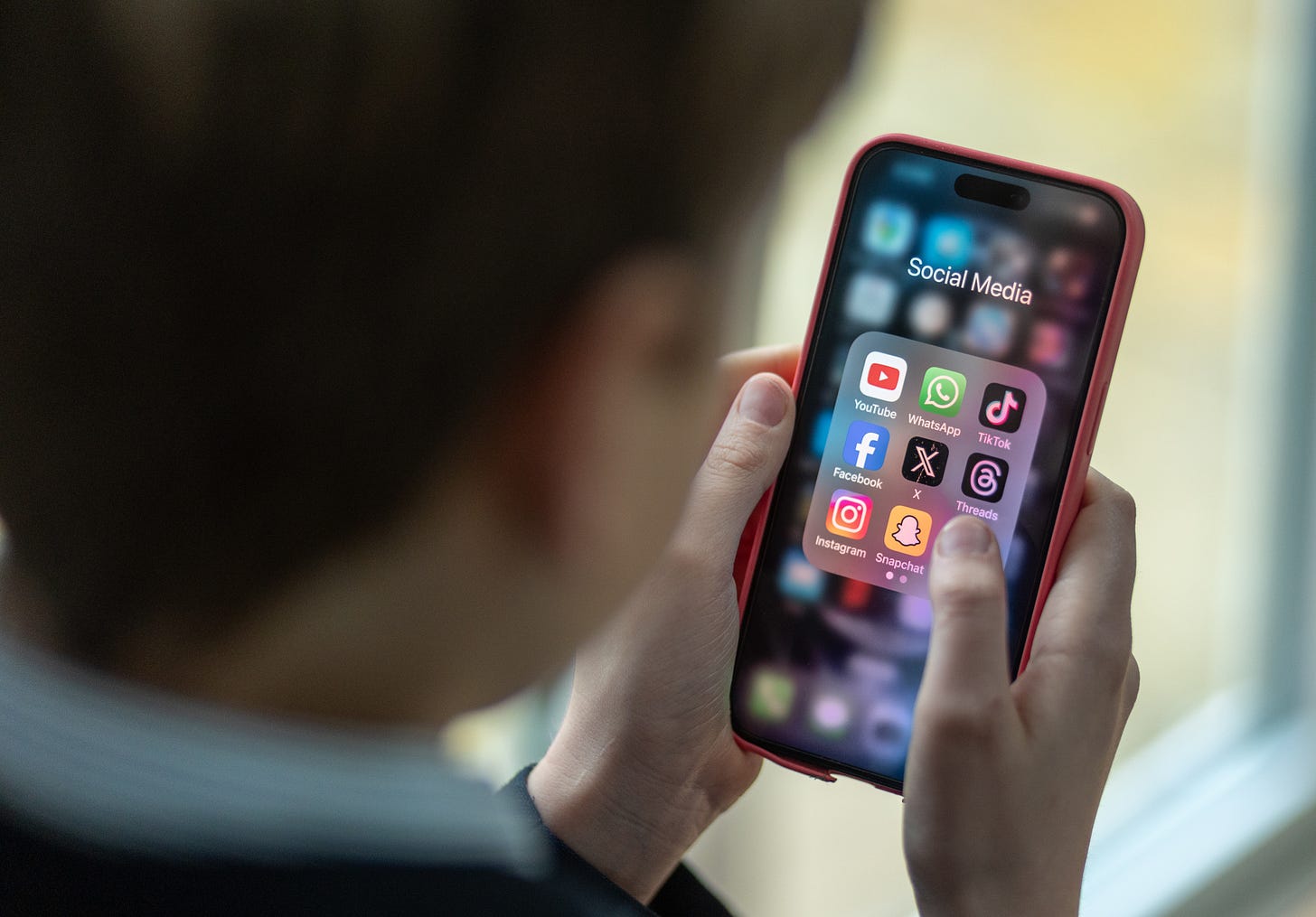A Mental Health Emergency
The surgeon general is asking for a strong measure to fix the problem
Wouldn’t it be great if we could see the faces of our young people? I hear they’re an attractive bunch, but how would we know? Currently, when I’m out for a walk, all I see are tops of heads as almost everyone, young and old — but especially young — is looking down and locked in to the latest on their mobile devices.
Don’t get me wrong. Checking in from time to time on social media is required these days. That’s not what this is about. The self-reported average social media usage among adolescents is 4.8 hours … a day. Most would call that an addiction. Kids are spending almost 5 hours every day staring at a screen rather than riding a bike, reading a book, or talking to another person.
And now, the U.S. surgeon general, Dr. Vivek Murthy, is calling for warning labels on social media apps, believing they are the most powerful tool available to combat what he calls a health crisis. In an opinion piece in The New York Times today, Dr. Murthy urged Congress to develop health and safety standards for social media platforms. He believes that the mental health crisis among young Americans is an “emergency” and social media is a big reason why.
Warning labels may sound like an extreme response to a crisis with often hard-to-see consequences, but Dr. Murthy is adamant that they can help. He points to warning labels on cigarettes. The first appeared in 1965, beginning a significant 50-year decline in Americans smoking.
“There is no seatbelt for parents to click, no helmet to snap in place, no assurance that trusted experts have investigated and ensured that these platforms are safe for our kids. There are just parents and their children, trying to figure it out on their own, pitted against some of the best product engineers and most well-resourced companies in the world,” Dr. Murthy wrote in the Times.
Social media addiction is no accident. It is a direct result of complex algorithms designed to keep you, and your children, scrolling. Add to that a toxic mix of anonymous bullying, unscrupulous trolls, and disinformation and it is no wonder that the risk of anxiety, depression, and suicidal ideation increases — some studies say it increases by as much as 50 percent among young people.
I have written a lot about young voters and the importance of their participation in this election. Dr. Murthy’s piece got me thinking about how social media plays a part, a seemingly large part in how young voters view the world and get information — or misinformation, as the case may be. A recent survey found that Gen Z gets their news from social media more than 2-to-1 over broadcast or cable news.
The BBC found that during a recent election in the UK, young voters were targeted on social media with fake AI-generated videos replete with misinformation. I am fairly certain the Atlantic Ocean is no barrier to this kind of deceptive work here in the U.S.
Can young people, or anyone for that matter, tell the difference between fake AI-generated video and the real thing? With young people now getting most of their news from social media, it is incumbent upon us to get it right and to meet them where they are. And where they are is on social media. A recent study found that Gen Z has a more favorable opinion of elected officials who post on social media, and not just about their jobs, but about popular culture. Young people believe it makes them more relatable.
But how do we make sure the young people aren’t harmed in the process? You can already hear the cries and complaints from the billionaire tech moguls and their social media companies that we don’t need more government regulation.
Well then, how about they better monitor their platforms? As Dr. Murthy points out, they have had 20 years to get it right, and it has only gotten worse.
Almost 1 in 4 middle and high school students have experienced cyberbullying in the past 30 days.
Cyberbullying victims of middle school age are twice as likely to attempt suicide as non-victims.
80 percent of Americans think that social media companies don’t do a good job addressing cyberbullying and want more laws to deal with the problem.
Social media has also become a dark place for young children, causing them to worry about body image and wonder why they don’t look as good as other kids on their screens. It’s a huge issue for young and developing minds. Poor body image can lead to eating disorders, which can become serious illnesses.
Congress would have to approve warning labels, so don’t look for this to happen tomorrow, but kudos to America’s top doc for sounding the alarm and raising awareness of how these platforms are likely harming our children. And to the young people I pass on my walks, please look up occasionally — I’d like to say hello!
If you value independent journalism that provides critical information to protect our democracy, please consider upgrading as a supporting member. It allows me to keep Steady sustainable and free for those who cannot afford it, especially in an election season when we need everyone to see it. Thank you.
No matter how you subscribe, I thank you for reading.
Stay Steady,
Dan




And it is a problem for more than just the young.
I hear a ton about young people being excessively on their devices but not enough people are talking about the parents being excessively on their devices. That fact
should be the most common headline.